
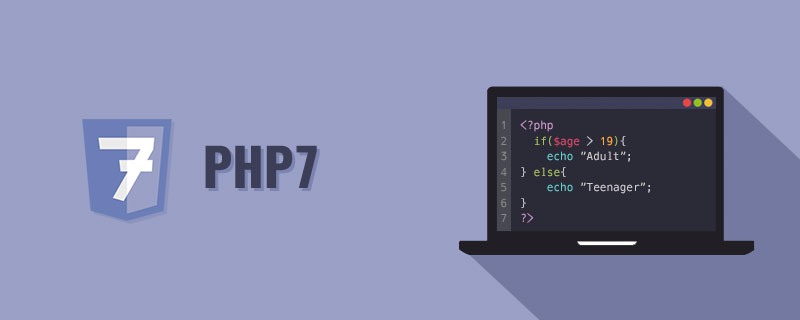 Comparison between PHP7 and HHVM
Comparison between PHP7 and HHVM
The performance of PHP7 in real scenarios is indeed equivalent to that of HHVM, and even exceeds HHVM in some scenarios. The operation and maintenance of HHVM is complex and it is a multi-threaded model. This means that if a thread causes a crash, the entire service will hang and it will not automatically restart. In addition, it uses JIT, which means that it needs to be warmed up after restarting. Without preheating, the performance will be worse. Moreover, the multi-threaded model is difficult to debug, which is very unsuitable for web services that pursue stability.
For versions before Nginx and PHP7.0, please refer to this article: Linux environment Nginx installation and debugging and PHP installation
The official version of PHP7.0 has been released around November 2015, and is currently PHP7.0.2 version, I first started following the first beta version of php7 in August 2015, and now the official version is released.
linux version: 64-bit CentOS 6.6
Nginx version: nginx1.8.0
php version: php-7.0.2
Recommended ( Free): PHP7
##Downloadwget http://php.net/get/php-7.0.2.tar.gz/ from/a/mirror
It is recommended to read the installation help file before installation INSTALLUnzip the installationtar zxvf php-7.0.2.tar .gz
cd php-7.0.2
First check the installation help./configure --help
./configure --prefix=/usr/local/php \
–with-curl –with-freetype-dir
– with-gd
–with-gettext
–with-iconv-dir
–with-kerberos
–with-libdir=lib64
–with-libxml-dir
–with- mysqli
–with-openssl
–with-pcre-regex
–with-pdo-mysql
–with-pdo-sqlite
–with-pear
–with-png- dir
–with-xmlrpc
–with-xsl
–with-zlib
–enable-fpm
–enable-bcmath
–enable-libxml
–enable-inline -optimization
–enable-gd-native-ttf
–enable-mbregex
–enable-mbstring
–enable-opcache
–enable-pcntl
–enable-shmop
–enable-soap
–enable-sockets
–enable-sysvsem
–enable-xml
–enable-zip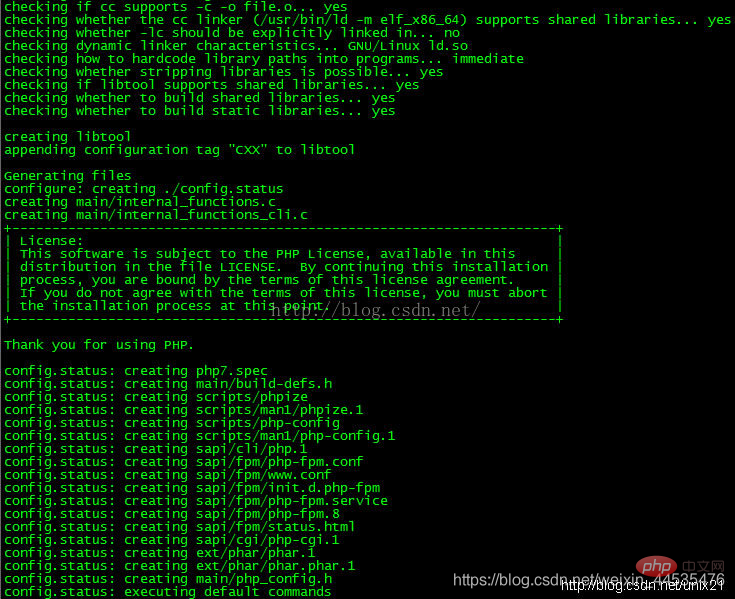 If the configuration is wrong, you need to install the required Module, install dependent libraries directly with yum
If the configuration is wrong, you need to install the required Module, install dependent libraries directly with yum
yum -y install libjpeg libjpeg-devel libpng libpng-devel freetype freetype-devel libxml2 libxml2-devel mysql pcre-devel
Note: There are several configurations that cannot be configured when installing php7beta3. You need to yum it. This is no longer the case with php-7.0.2.yum -y install curl-devel
yum -y install libxslt-devel
Compile and installmake && make install
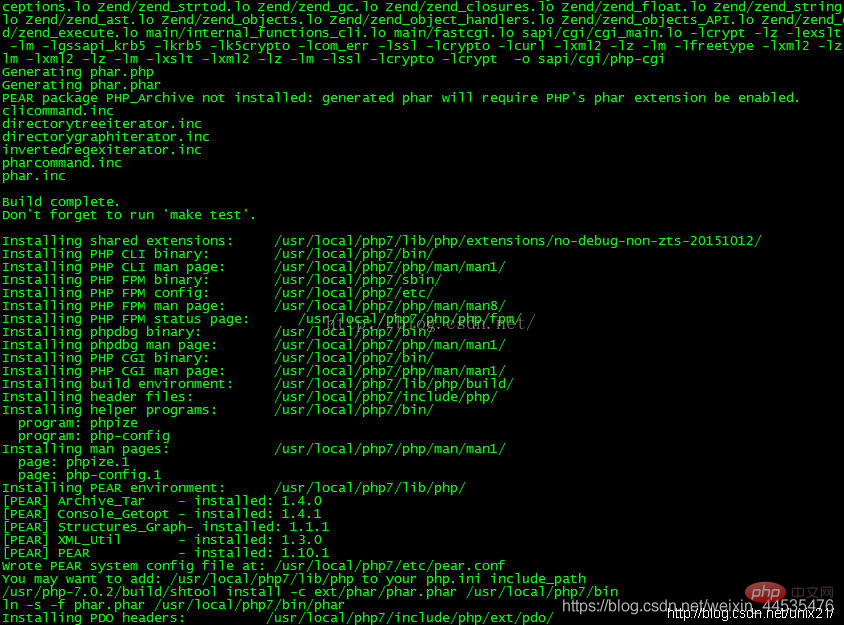
cp php.ini-development /usr/local/php /lib/php.ini
cp /usr/local/php/etc/php-fpm.conf.default /usr/local/php/etc/php-fpm.conf
cp /usr/local/php/etc/php-fpm.d/www.conf.default /usr/local/php/etc/php-fpm.d/www.conf
cp -R ./sapi/fpm/php-fpm /etc/init.d/php-fpm
It should be noted that www in php7 The .conf configuration file configures the port number and other information of phpfpm. If you modify the default 9000 port number, you need to change it here, and then change the nginx configuration Start
/etc/init.d /php-fpm
View phpinfo()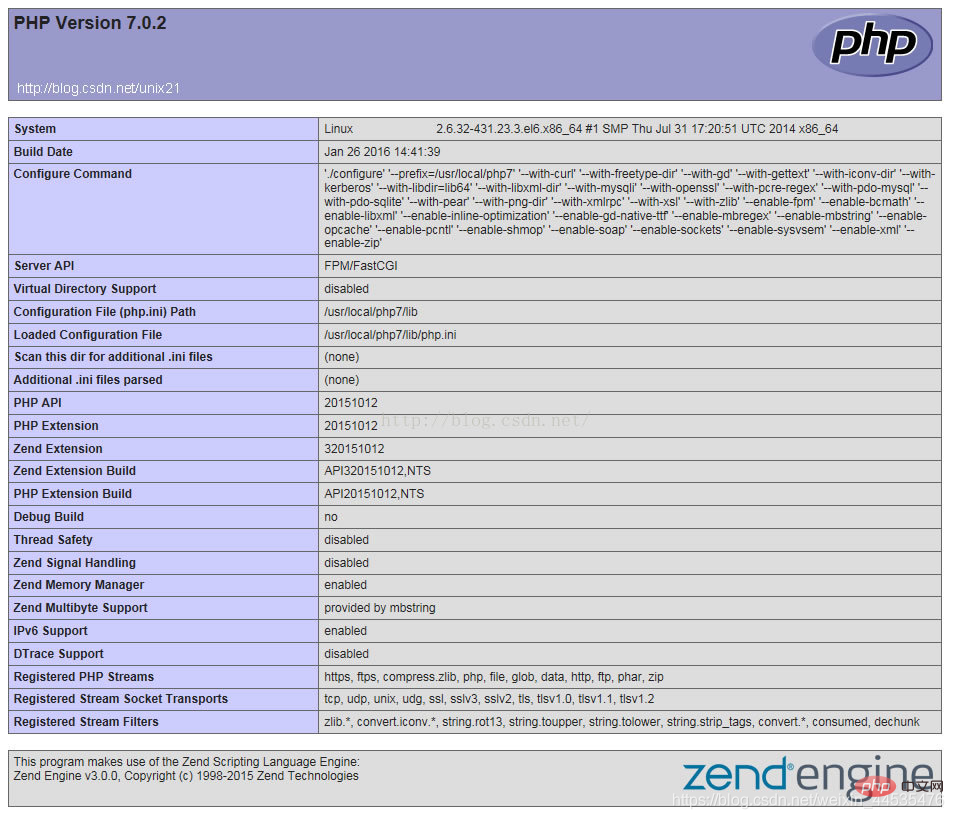
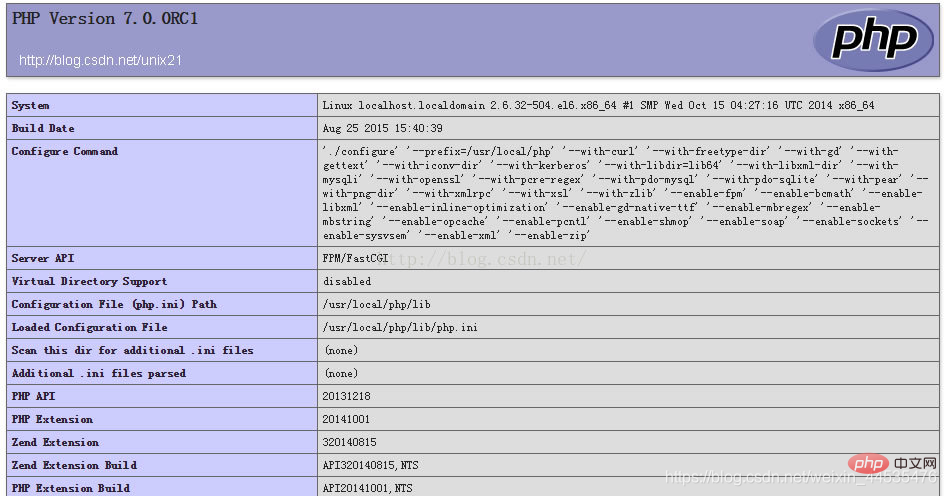
php7 and php5 performance analysis comparison
[root@localhost www5.4.44]# time /usr/local/php5.4.44/bin/php search_by_key.php
user 0m0.300s
sys 0m0.050s
[root@localhost www]# time /usr/local/php/bin/php search_by_key.php
real 0m0.361s
user 0m0.304s
sys 0m0.057s
[root@localhost www7]# time /usr/local/php7/bin/ php search_by_key.php
real 0m0.114s
user 0m0.097s
sys 0m0.017s
Official website address: http://php.net/opcache
Use the following recommended settings to obtain better performance:
opcache.memory_consumption=128
opcache.interned_strings_buffer=8
opcache.max_accelerated_files=4000
opcache.revalidate_freq=60
opcache.fast_shutdown=1
opcache.enable_cli=1
You can also disable opcache.save_comments and enable opcache.enable_file_override. It should be reminded that the above configuration must be rigorously tested before being used in a production environment. Because there is a known issue with the above configuration, it will cause exceptions in some frameworks and applications, especially when there are documents using comment annotations.
vim /usr/local/php7/etc/php.ini
Join
zend_extension=/usr/local/php7/lib/php /extensions/no-debug-non-zts-20141001/opcache.so
restart
killall php-fpm
/etc /init.d/php-fpm
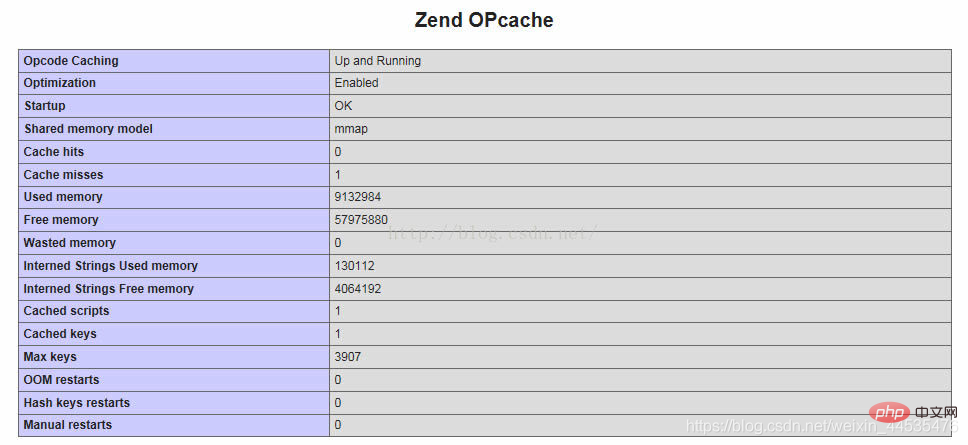
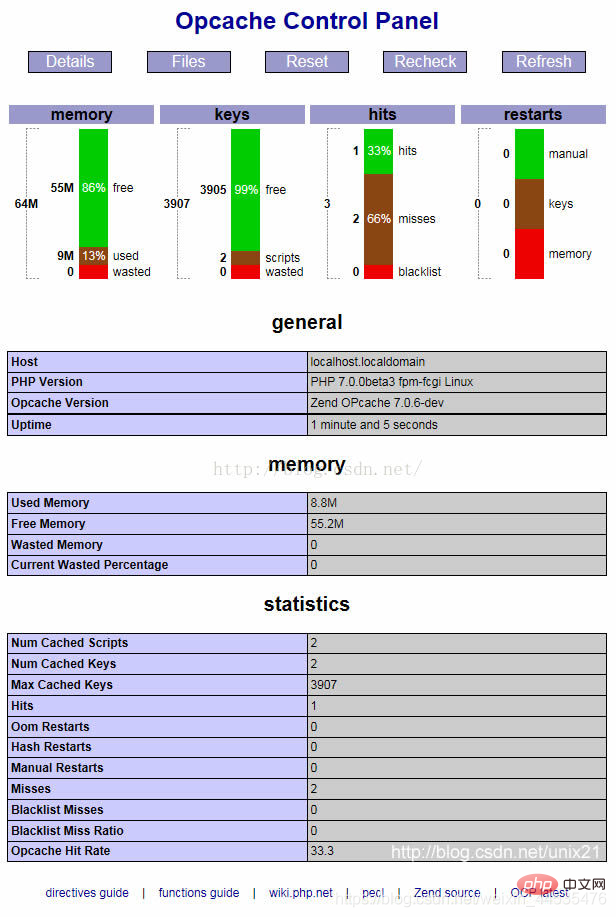
Opcache status test code (https://gist.github.com/ck-on/4959032) Give a demo:
<?php /*
OCP - Opcache Control Panel (aka Zend Optimizer+ Control Panel for PHP)
Author: _ck_ (with contributions by GK, stasilok)
Version: 0.1.6
Free for any kind of use or modification, I am not responsible for anything, please share your improvements
* revision history
0.1.6 2013-04-12 moved meta to footer so graphs can be higher and reduce clutter
0.1.5 2013-04-12 added graphs to visualize cache state, please report any browser/style bugs
0.1.4 2013-04-09 added "recheck" to update files when using large revalidate_freq (or validate_timestamps=Off)
0.1.3 2013-03-30 show host and php version, can bookmark with hashtag ie. #statistics - needs new layout asap
0.1.2 2013-03-25 show optimization levels, number formatting, support for start_time in 7.0.2
0.1.1 2013-03-18 today Zend completely renamed Optimizer+ to OPcache, adjusted OCP to keep working
0.1.0 2013-03-17 added group/sort indicators, replaced "accelerator_" functions with "opcache_"
0.0.6 2013-03-16 transition support as Zend renames product and functions for PHP 5.5 (stasilok)
0.0.5 2013-03-10 added refresh button (GK)
0.0.4 2013-02-18 added file grouping and sorting (click on headers) - code needs cleanup but gets the job done
0.0.2 2013-02-14 first public release
* known problems/limitations:
Unlike APC, the Zend OPcache API
- cannot determine when a file was put into the cache
- cannot change settings on the fly
- cannot protect opcache functions by restricting execution to only specific scripts/paths
* todo:
Extract variables for prefered ordering and better layout instead of just dumping into tables
File list filter
*/
// ini_set('display_errors',1); error_reporting(-1);
if ( count(get_included_files())>1 || php_sapi_name()=='cli' || empty($_SERVER['REMOTE_ADDR']) ) { die; } // weak block against indirect access
$time=time();
define('CACHEPREFIX',function_exists('opcache_reset')?'opcache_':(function_exists('accelerator_reset')?'accelerator_':''));
if ( !empty($_GET['RESET']) ) {
if ( function_exists(CACHEPREFIX.'reset') ) { call_user_func(CACHEPREFIX.'reset'); }
header( 'Location: '.str_replace('?'.$_SERVER['QUERY_STRING'],'',$_SERVER['REQUEST_URI']) );
exit;
}
if ( !empty($_GET['RECHECK']) ) {
if ( function_exists(CACHEPREFIX.'invalidate') ) {
$recheck=trim($_GET['RECHECK']); $files=call_user_func(CACHEPREFIX.'get_status');
if (!empty($files['scripts'])) {
foreach ($files['scripts'] as $file=>$value) {
if ( $recheck==='1' || strpos($file,$recheck)===0 ) call_user_func(CACHEPREFIX.'invalidate',$file);
}
}
header( 'Location: '.str_replace('?'.$_SERVER['QUERY_STRING'],'',$_SERVER['REQUEST_URI']) );
} else { echo 'Sorry, this feature requires Zend Opcache newer than April 8th 2013'; }
exit;
}
?>nbsp;html>
<p>
</p><h1><a>Opcache Control Panel</a></h1>
<p>
<a>Details</a>
<a>Files</a>
<a>Reset</a>
<?php if ( function_exists(CACHEPREFIX.'invalidate') ) { ?>
<a>Recheck</a>
<?php } ?>
<a>Refresh</a>
</p>
<?php
if ( !function_exists(CACHEPREFIX.'get_status') ) { echo '<h2>Opcache not detected?'; die; }
if ( !empty($_GET['FILES']) ) { echo '<h2>files cached</h2>'; files_display(); echo 'The above is the detailed content of Introduction to PHP7.0 installation in Linux environment. For more information, please follow other related articles on the PHP Chinese website!